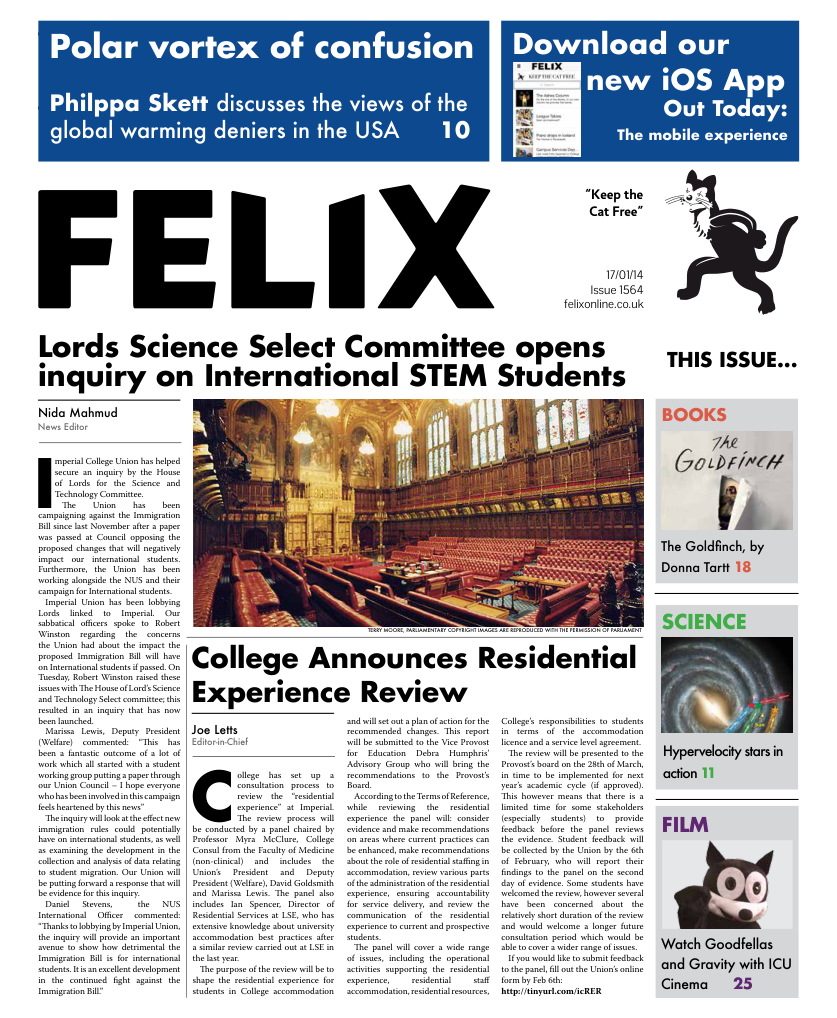Minister announces new research opportunities
David Willetts uses visit to Imperial to announce the creation of new Doctoral Training Centres
New funding for UK research institutions has been announced by the Minister of State for Universities and Science, David Willetts. During a visit to Imperial College last Friday, Willetts announced the formation of nineteen new Centres for Doctoral Training (CDT) which will be funded through the Engineering and Physical Sciences Research Council (EPSRC) with the money ultimately sourced primarily from industry partners. CDTs are an increasingly common means of providing PhD studentships – with each centre offering a four year course in a particular area of science and engineering, focusing on research but also including taught elements.
Willetts was keen to stress that: “the Government will be investing in a further 900 students through an additional 19 Centres for Doctoral Training (CDTs), bringing our total investment in CDTs to £390 million”. Professor David Delpy, Chief Executive of the EPSRC, added that: “these new CDTs will provide training and advances in research in many areas of science and engineering including quantum technologies, manufacturing, robotics, energy and sustainability and bring the total number of Centres funded in this round to ninety one.”
Three of the centres – focusing on Plastic Electronic Materials, Sustainable Civil Engineering and Nuclear Engineering – will be based at Imperial. In a statement Professor James Stirling, College Provost, said: “Securing a further three CDTs to add to the seven already awarded cements Imperial’s position as a leader in postgraduate education and research, helping to produce the next generation of scientists, engineers and industrialists who will drive the UK’s economic recovery.”
While touring the Department of Aeronautics, Willetts also announced the formation of a new National Wind Tunnel Facility, which will bring together Imperial, Oxford, Cambridge and four other universities. The College has a long tradition of wind tunnel research with Bluebird-Proteus CN7, the car which broke the land speed record in 1964, having been tested here. Imperial will receive £4million of the £13.3million dedicated to this new project, which will be used to improve the its five existing wind tunnels.
Professor Jonathan Morrison, Chair of Experimental Fluid Mechanics in the Department of Aeronautics, said: “The Government’s much needed investment in the nation’s leading wind tunnel facilities will have a transformative effect and drive innovation across a broad range of sectors in a variety of fields. At Imperial, this will help us, for instance, to design bridges that can better withstand wind induced vibrations and more efficient wind turbines, and to develop better aircraft wings that improve fuel efficiency.” Stirling added: “Imperial’s wind tunnels have historically played a pivotal role in the development of Formula One car design, with many of our graduates going on to important careers in the industry. New funding will help secure our global advantage in this field, fostering greater capacity and driving forward much needed research in a range of areas, from green energy to more fuel efficient aircraft.”
Willetts emphasised the economic importance of the new funding, saying: “This new investment will support research that is vital to the UK economy, including developing the next generation of fuel efficient heavy goods vehicles. This will create huge energy savings to businesses, as well as bringing environmental benefits. It is pioneering work that will help the UK get ahead in the global race.”








